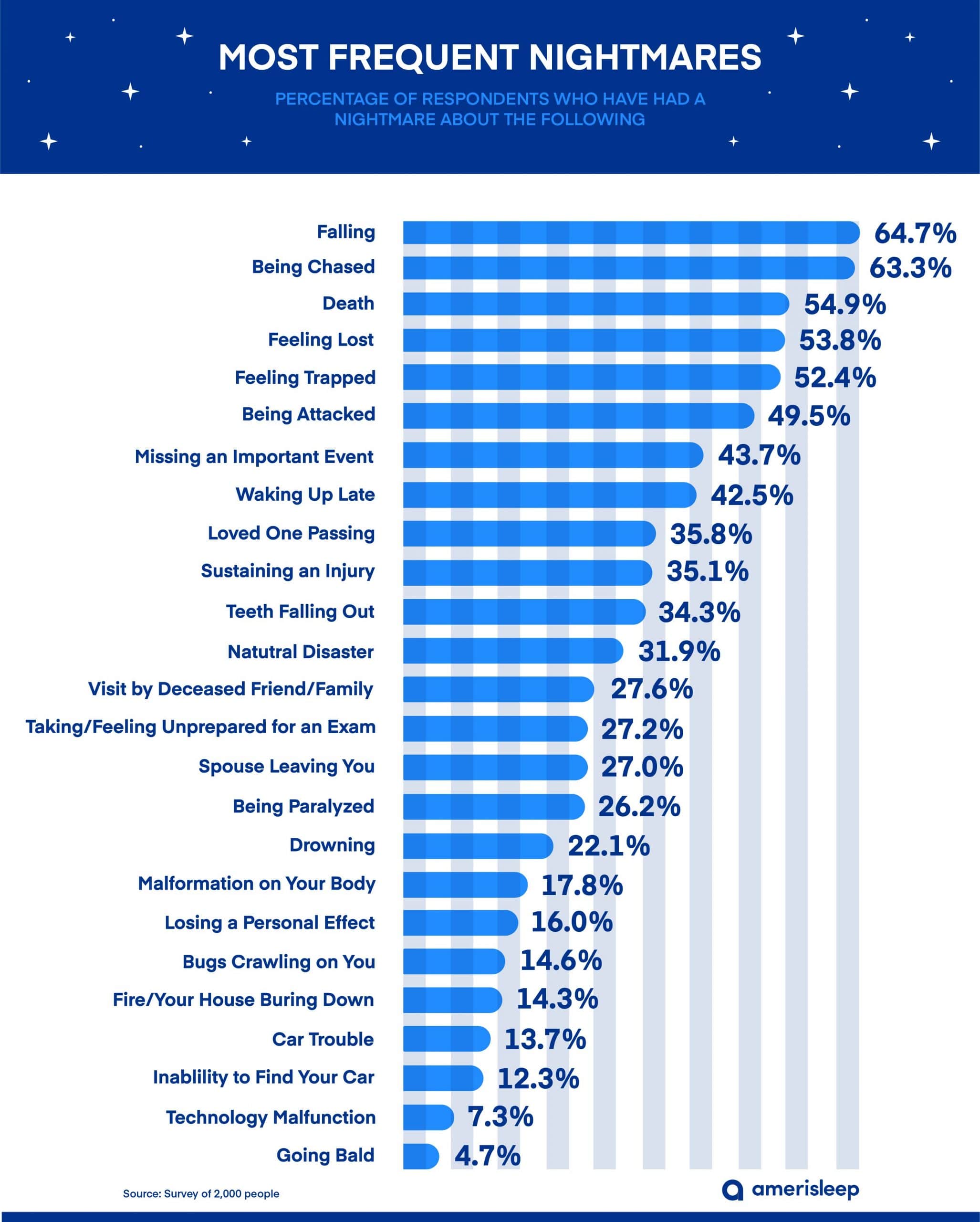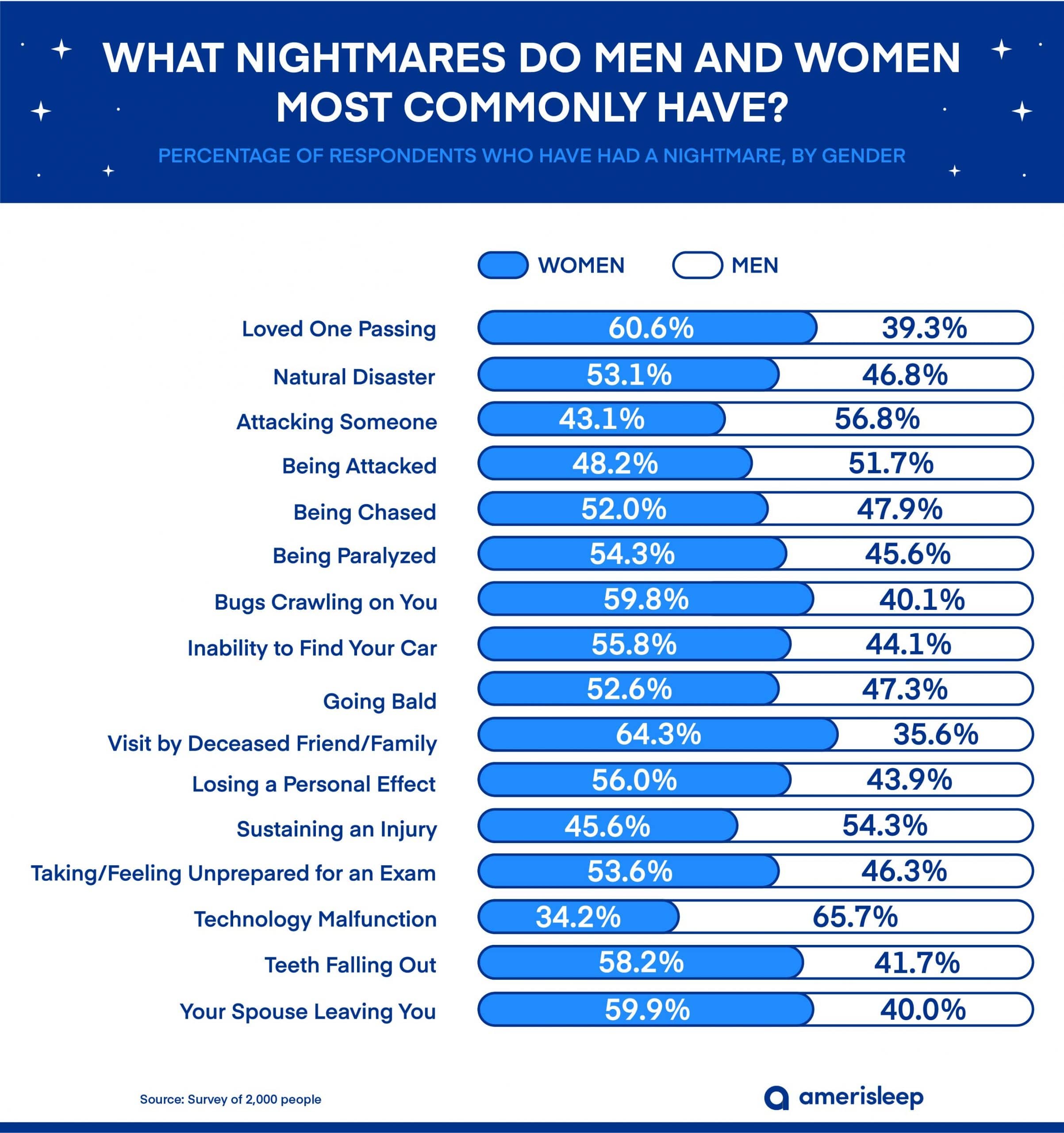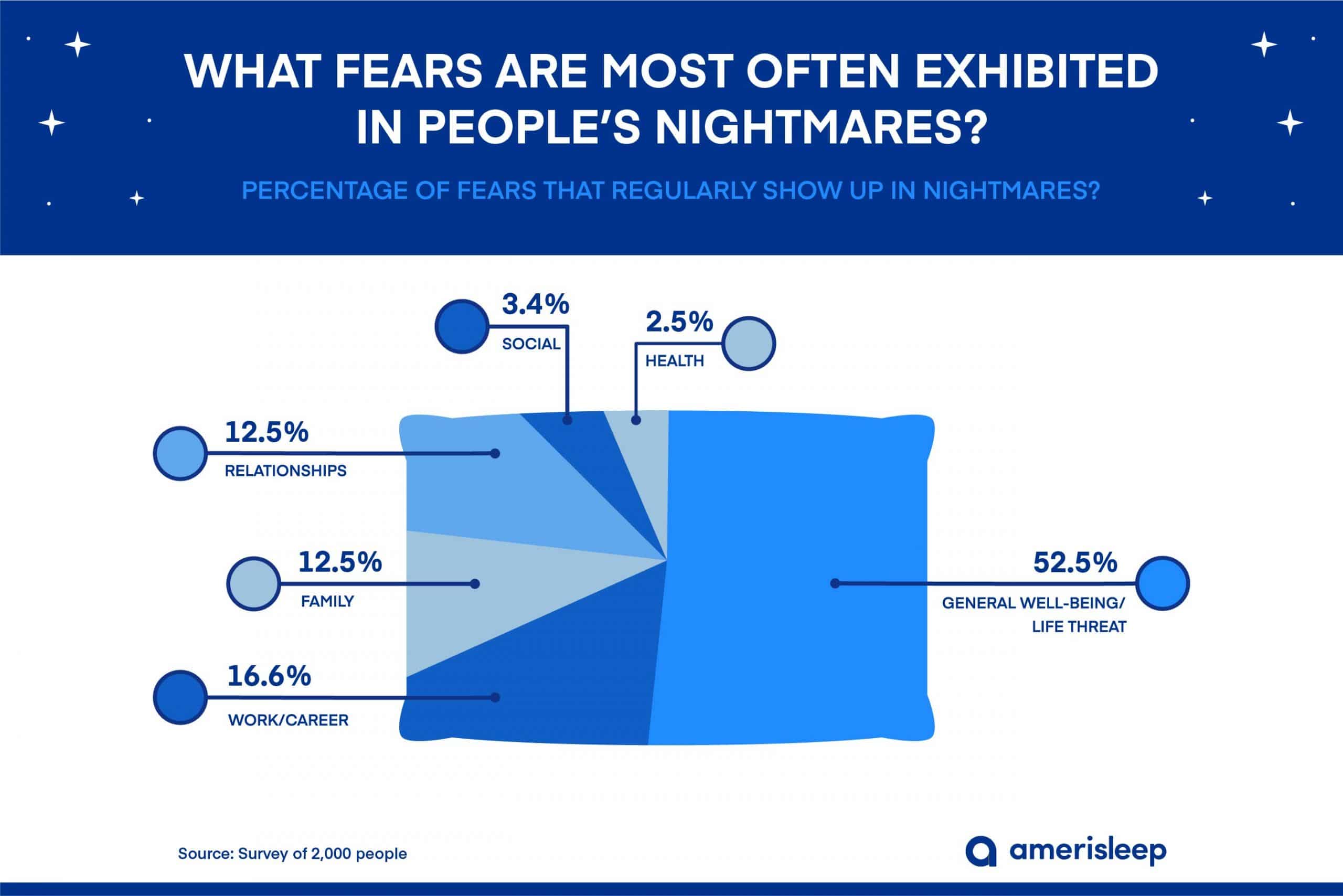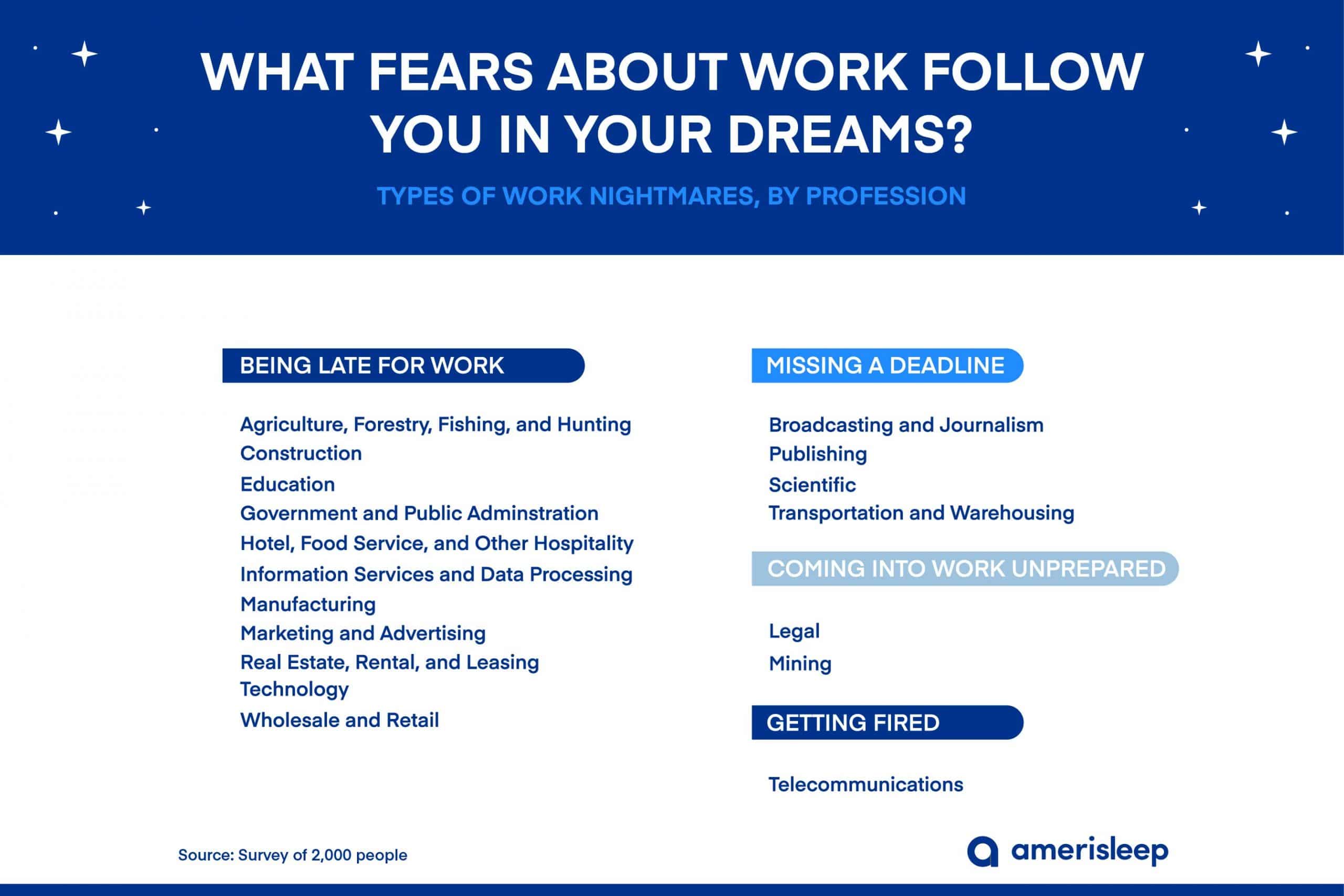How Long Does It Take for the Ultimate Nightmare to Manifest Again
No one loves experiencing a terrifying nightmare, yet almost everyone has had one.
To find out what wakes us up in the middle of the night and causes our heart to beat out of our chest, we surveyed 2,000 people about their anxiety-fueled nightmares. It turns out we tend to be scared or anxious about the same things. We then broke down the data further by gender and relationship status. Continue reading to see what we discovered.
When You Fall Asleep, and Keep Falling

Many of our respondents' nightmares were shrouded in fear, which is no surprise considering the word "nightmare" is defined as a dream full of extreme anxiety or sorrow. Nearly 65 percent of our survey takers experienced falling most frequently in their nightmares. While this type of nightmare is nearly universal, experts don't quite know what causes people to dream this way. One theory suggests that when your muscles relax as you enter sleep, your brain interprets it as an actual fall. Another theory suggests that dreams about falling are a result of your nervous system gearing down for the night.
Nightmares about falling were followed closely by dreams about being chased (more than 63 percent). Other distressing nightmares included death (roughly 55 percent), feeling lost (almost 54 percent), feeling trapped (52 percent), and being attacked (nearly 50 percent).
While not as common, dreams focusing on poor performance – whether at school or at work – sustaining an injury, and drowning also made an appearance on the list.
The Gender Divide

Significant divergences between men and women included nightmares about a loved one dying. More specifically, nearly 61 percent of women dreamed about this unfortunate event, while roughly 39 percent of men have experienced the same. This may possibly have something to do with gender stereotypes and the expectation that women are the caregivers of the family.
Additionally, nightmares about technology malfunctions tended to occur more commonly in men (almost 66 percent), while about 60 percent of women reported having dreams about bugs crawling on them. This isn't surprising considering that the Zika virus was an earlier concern. Women are also more apt to have nightmares about fires or their house burning down (about 62 percent).
The Fears in Our Dreams

A wide variety of things can cause nightmares, including daily stress. Major life changes – such as a move, a new job, or a family member passing – are particularly stressful, as are traumatic incidents, such as an accident, attack, or injury.
In our survey, we asked people to tell us what fears they most frequently experienced in their nightmares, and we found that the majority of respondents (nearly 53 percent) had nightmares that focused on dangers to their well-being. Work-related fears accounted for almost 17 percent of recurring nightmares, followed by family and relationship issues (both 12.5 percent). Nightmares about friendships and health were each mentioned by fewer than 4 percent of respondents.
Bringing It Home With You

Nightmares can and do follow us home from work . According to our survey, broadcasters and journalists were often plagued by nightmares about missing a deadline, probably because their daytime hours can be filled with the same horrors that dreamland has in store for them. Respondents in almost every industry had frequent nightmares about being late to work.
Conclusion
Nightmares are an unfortunate reality for most of us, but they can be a way to subconsciously work out normal and excessive stresses in our lives. Within the data, we found that nightmares about dangers to our well-being were pretty common, while work-related terrors followed directly behind.
To help you get a more restful night of sleep and put those anxiety-filled nightmares behind you, check out Amerisleep.com and find your best mattress.
Tips for Healthier Sleep
Getting quality sleep doesn't have to be a nightmare. Below are simple steps you can take to fall asleep fast stay asleep longer.
- Limit the use of technology before bed. This isn't necessarily only an issue with blue lights but how stimulated we are making our senses. Watching videos or working a late-night project keep the mind active and is counterproductive to a good night's rest.
- Eat a healthy diet. What you eat (and when you eat it) plays a significant factor in how your body falls asleep. Eating too close to bedtime can lead to digestive issues that are not conducive to quality sleep. Stick to eating at least one hour before sleeping and avoid red meats, spicy foods, and caffeinated snacks.
- Incorporate exercise into your daily routine. There is plenty of literature about the benefits of daily exercise. Sleep experts are starting to see how exercise also promotes better sleep.
Another thing to consider? Your mattress. The best mattresses are ones that support your body's natural sleep posture while reducing pressure points. Reducing pressure points helps to keep you from tossing and turning.
Sleeping on a comfortable mattress and following the steps above play a significant role in getting refreshing sleep each night.
Methodology
We surveyed more than 2,000 people regarding their nightmares and dreams. To make the data easier to read on the infographics, we rounded percentages to the nearest tenth. This may cause some figures to only add up to ninety-nine percent.
Sources
- http://www.today.com/health/zika-virus-worries-pregnant-women-u-s-mosquito-season-approaches-t100781
- https://www.washingtonpost.com/local/daughters-tend-to-aging-parents-more-often-than-sons-but-some-are-seeking-a-change/2014/12/05/b593f554-74ee-11e4-9d9b-86d397daad27_story.html
- http://www.mayoclinic.org/diseases-conditions/nightmare-disorder/basics/causes/con-20032202
- http://www.huffingtonpost.com/2011/07/13/dreams-about-falling_n_891626.html
- https://www.psychologytoday.com/us/conditions/nightmares
Fair Use Statement
There's no reason that using the above images as you wish should cause anxiety that may manifest later as a nightmare. We welcome you to share and use them! All we ask is for you to please link back to this page so the designers and authors of it get credit for the work they put in.
About the author
McKenzie Hyde is a Certified Sleep Science Coach and a full-time writer focused on sleep health and the mattress industry. She currently writes articles on a variety of topics, ranging from sleep hygiene to the newest trends in the mattress and bedding industry. Just some of the topics she has covered include best sleep practices for students, the consequences of going without sleep, and choosing the right bed if you suffer from back pain. McKenzie Hyde holds a Master of Arts degree from Utah State University where she studied literature and writing. While there, she taught argumentative writing and wrote a variety of articles and analyses for literary and academic journals.
View all posts
You'll enjoy these posts
Based on your reading history, we think you'll enjoy these posts…
Source: https://amerisleep.com/blog/what-are-the-most-common-nightmares/
0 Response to "How Long Does It Take for the Ultimate Nightmare to Manifest Again"
Post a Comment